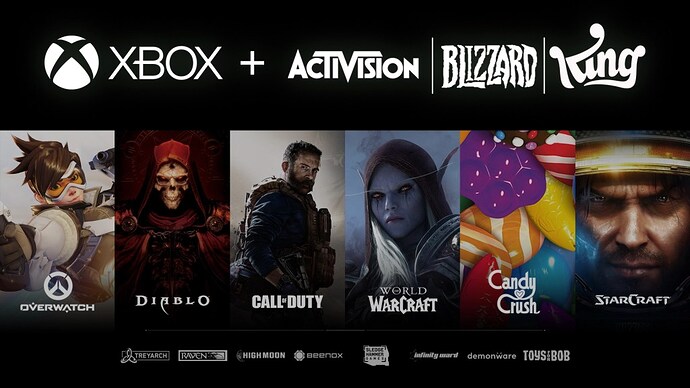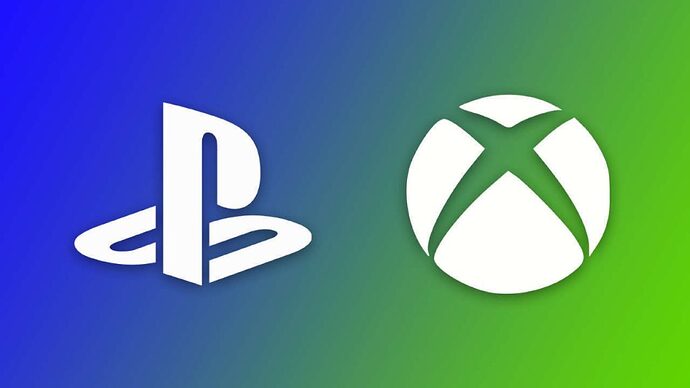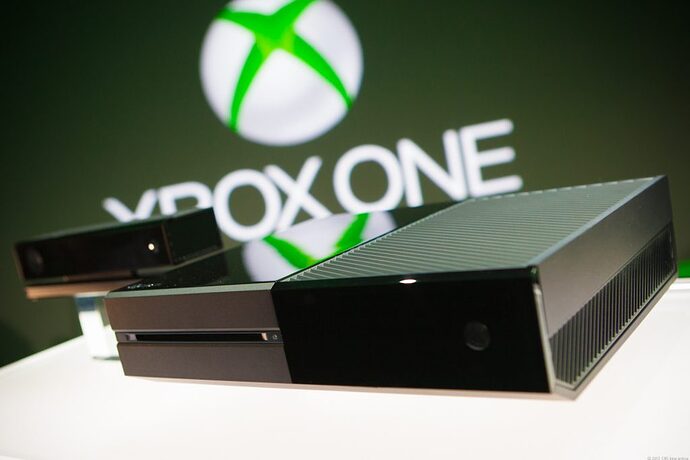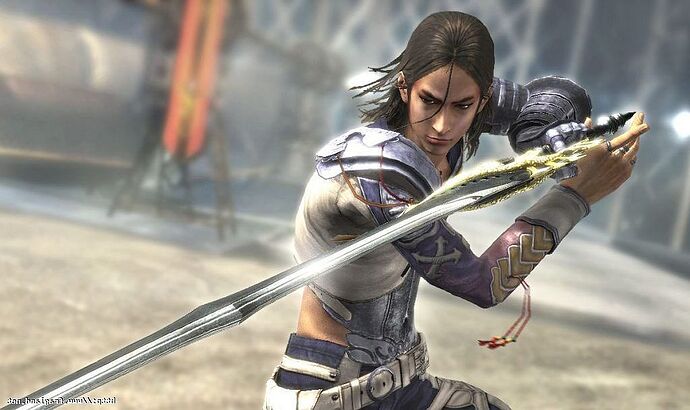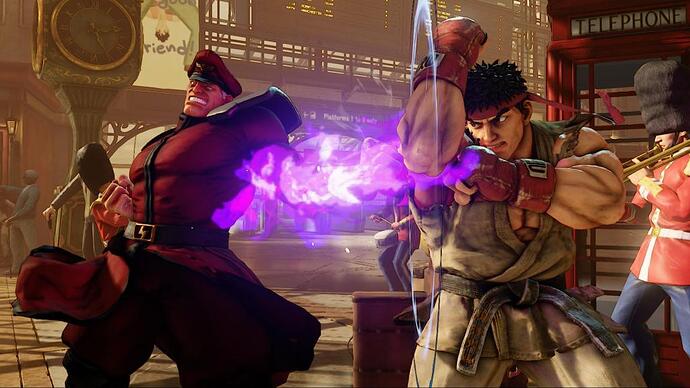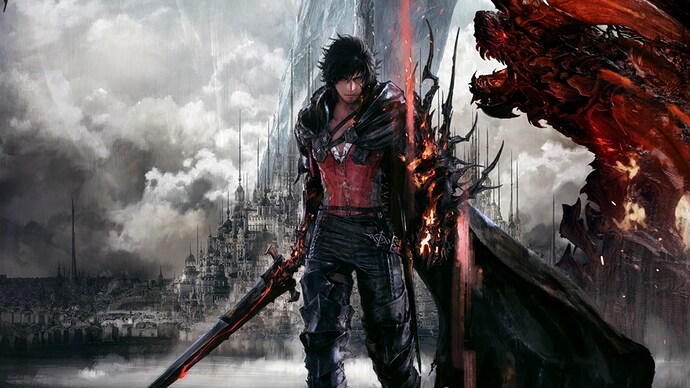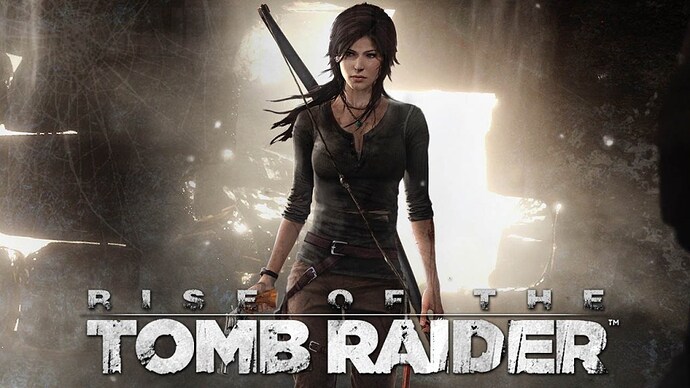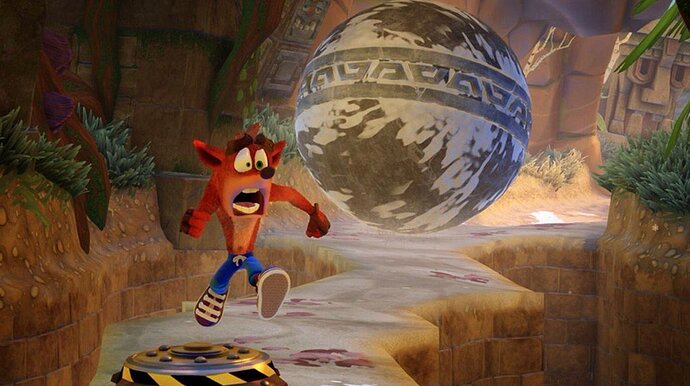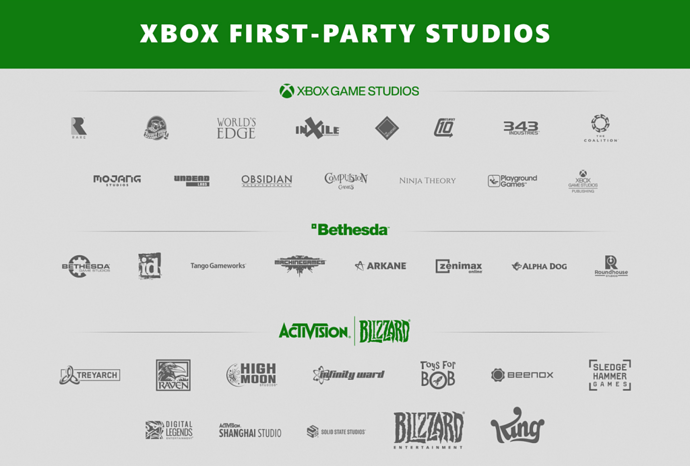Originally published at: The Evolving War of Exclusivity - XboxEra
Earlier this week, a forum post started trending on Reddit and across Twitter with regards to the ongoing discussion around the acquisition of Activision, Microsoft, Sony and what it means for exclusive content going forward.
For good reason, the post struck a nerve with many, some voicing support to its argument, others, disagreeing entirely.
Now, the original author of that post is here to flesh things out a little via our Community Corner feature, where we let the community have their say.
Setting The Stage
With the news that Xbox is set to acquire Activision Blizzard the topic of large-scale acquisitions of games publishers has returned to the forefront. Initially kicked into overdrive with Microsoft’s 2020 acquisition of Bethesda for $7.5bn, there has been much discussion about the nature of exclusivity, and the varying means available to platform holders to secure exclusive titles to help distinguish and bolster the appeal of their consoles or ecosystems.
A common sentiment that appears to prevail through these discussions is the idea that securing exclusivity of popular IP on a game-by-game basis via paid deals with a third-party publisher – the affectionately termed “moneyhat” – is an acceptable means of competition between platforms holders, whereas the acquisition of IP via studio or publisher acquisitions is an egregious course of action to be derided.
The distinction, however, is not as clear cut as many would look to portray it.
To be clear, every major platform holder in gaming engages in the practice of signing exclusivity deals with third-party studios or publishers to gain content that differentiates their platform and to make their platform more appealing to consumers.
This is true whether we are talking about Nintendo, PlayStation, Xbox, Epic or Oculus.
Tale As Old As Time
Paying to secure exclusive content is just a basic reality of the gaming market – and indeed any content driven market – and is not a simple black-and-white case of being inherently good or bad. However not all deals are made equal, and that is where we can start to examine things more closely.
Whilst the practice of paying for timed or full exclusivity of third-party games has been embraced by all platform holders, the most notable and successful examples of this tend to be for PlayStation.
The reasons for this make a lot of sense, if you apply a little thought. Third-party publishers aren’t in the habit of signing exclusivity deals that they feel will impact them or their IP negatively. As a result, the stronger the position a platform holder has in the current market, the easier it is to negotiate deals for more prominent releases.
As the most consistent leader in the home console market, this has typically left Sony in the most advantageous position for such deals, and they have never been shy to flex this to the maximum extent possible.
Having come off a turbulent seventh console generation (360/PS3/Wii), Sony found themselves headed into the eighth console generation with all the momentum on their side.
Nintendo had squandered their strong position they had held with the Wii, by releasing the confusingly marketed Wii U, and Microsoft was busy shooting themselves in both feet (and clubbing themselves over the head for good measure) announcing the Xbox One with a focus on media capabilities as opposed to focusing more directly on what most of us buy a console for – gaming. Combined with some truly shocking messaging surrounding their DRM plans for the console, and the unfortunate decision to mandate the inclusion of the Kinect at a time where consumer privacy was a very sensitive topic, Microsoft was not off to a strong start.
Now, you’ve all likely heard this story before. Regardless, this put Sony in the driving seat from the very beginning of that console generation, and they went all in on looking to ensure it remained that way perpetually going forwards.
Renting Exclusivity
Sony began to sign one exclusivity deal after another, and they were able to do this largely unopposed. They had market-share on their side, making deals relatively cheap to complete, contrasted with how much it would likely cost for Microsoft to secure the same title for Xbox. It’s also worth acknowledging that Xbox spent this period of time under the Windows division, and their budgets were seemingly curtailed.
More importantly however, Sony had the widespread acceptance from both consumers and the games media that meant they were able to sign these deals with little to no repercussions to their brand image.
When you consider a series such as Final Fantasy, it’s not surprising when the sales for a multiplatform entry disproportionately favour PlayStation platforms.
Exclusivity deals for genre-defining titles actively reinforce (or in some cases disrupt) audiences for that specific type of game. Final Fantasy was not always automatically associated with PlayStation consoles.
For the first six games, the series was linked to Nintendo consoles. This changed with Final Fantasy VII as Square’s vision for the game led it to become a PlayStation exclusive. This remained the case up until the seventh generation, where Final Fantasy XIII came to Xbox 360 day and date with the PlayStation 3 version of the game.
Most of the sales were still on PlayStation, due to the IPs long history on that platform, however this was the beginning of an audience for JRPGs being cultivated for Xbox, along with Microsofts own pushes into the genre with exclusively funded titles like Blue Dragon and Lost Odyssey.
Now, if someone were heavily into JRPGs, Xbox 360 was a viable purchase because it no longer meant that their desire to play Halo came at the expense of being able to play Final Fantasy. So, it was hardly a random selection when Final Fantasy VII Remake was announced as a console exclusive for PlayStation 4.
By removing the ability to play such a key series within a genre, it makes the platform that loses it far less viable as a choice for anyone that is a fan of that genre. The message is clear… if you like this type of game, PlayStation is now your only real option.
Final Fantasy of course isn’t the only such game. Within each genre there tends to be a couple of clear standout IP that carry so much gravity, that their absence is felt across the genre. Another such game is Street Fighter, that Sony managed to secure as a lifetime console exclusive for PS4, which effectively buried the entire fighter genre on Xbox as a result. If you’re serious about competitive fighters, then you’re almost certainly not going to opt for the console that lacks the latest Street Fighter game.
This is true even if you don’t play Street Fighter yourself, because the reality is, communities for other fighting games will follow also. This creates a ripple effect where other more niche titles in the genre become likely to skip the platform too, because if one other platform has an effective monopoly on the audience for the game they’re looking to sell, it starts to make less sense devoting any significant resources to developing the game for the platform that lacks them. This can then become a self-fulfilling cycle that leads to more and more games in the genre skipping the affected platform.
Xbox Has No Games
The titles Sony had been striking deals for throughout the last generation were designed primarily to render the Xbox platform non-viable for the majority of the market. The yearlong exclusivity of DLC for Destiny and the deals for timed exclusivity of maps for Call of Duty were signed with the intent of dislodging Xbox as the primary choice of console for fans of the FPS genre. The exclusivity of Street Fighter ensured that fans of fighting games couldn’t select Xbox as their primary console either. And the exclusivity of Final Fantasy reinforced that Xbox was not the place to be if you wanted to ever reliably receive JRPGs.
This eventually birthed the stigma that Xbox simply had “no games”. This obviously didn’t mean that Xbox had no games to play at all, but rather that the Xbox games library was in effect a subset of what you could get if you bought a PlayStation instead.
By the time the generation had reached its mid-point, there was plenty of speculation as to whether this would be Microsoft’s last console, and that Xbox would either be sold off or just shut down entirely.
Microsoft did in the end opt to continue their push into gaming and began to gear up for the launch of their next console(s), the Xbox Series X|S. Sony, having seen such success with their exclusivity playbook in the previous generation, wasted no time in looking to deal a killing blow right out of the gate with PlayStation 5.
They announced shortly before the launch of the consoles, that they had secured Final Fantasy XVI as an exclusive for a minimum of one year, and reports citing Imran Khan’s claims that Sony had secured numerous “huge” previously multiplatform games as timed exclusives for PlayStation 5 meant the landscape wasn’t looking a whole lot brighter for Xbox in the coming generation.
Interestingly however, this potential scenario didn’t appear to spark much concern amongst gamers, or for that matter the wider gaming media. It was widely just accepted that Sony’s momentum coming of the PlayStation 4 would transition over to PlayStation 5, and they would continue to go from strength to strength largely unimpeded.
So, with all this going on, the most obvious question to ask at this point is why? If these timed exclusivity deals are so powerful, why aren’t team Xbox firing back with a bunch of comparable deals of their own?
It is this question, that we need to cast our minds back to 2015, where Microsoft did land a huge, timed exclusivity deal, for Rise of the Tomb Raider.
One Rule for Some…
The announcement that Rise of the Tomb Raider would be launched as an Xbox console exclusive immediately drew the ire of gamers all over the world. It was portrayed as an objective negative scenario where nobody wins – except Microsoft.
Many people cited how this particular exclusivity deal was far worse than other comparable deals, for two reasons. Firstly, a timed exclusivity deal for Xbox negatively impacted a larger percentage of gamers due to Xbox being the less popular platform at the time.
Secondly, Tomb Raider as an IP was seen as being associated primarily with PlayStation, due to its legacy of releases on PlayStation consoles. The latter of these two reasons is more than a little ironic, given how Tomb Raider was initially a Sega Saturn game, that was released also on PlayStation shortly after.
Upon seeing the huge success for the game, Sony struck a deal with Eidos to ensure Tomb Raider II and any other sequels would launch as console exclusives to PlayStation, effectively cutting off both Sega and Nintendo from any further entries until the year 2000.
The announcement of Rise of the Tomb Raider’s console exclusivity was initially left purposely vague, with only the statement that the game would launch Holiday 2015 as an Xbox console exclusive. The uncertainty regarding the nature of the game’s exclusivity wouldn’t last long however, as Microsoft and Square Enix were immediately pressed for clarification on whether the game would release on other platforms.
Within 24 hours from the initial announcement Microsoft finally relented and confirmed that the exclusivity was timed and the game would later be released on PC and PS4. So good job to all us gamers around the world – alongside the gaming media for cutting straight through the nonsense and extracting clarification with such efficiency.
The issue here, however, is that there were a number of titles that Sony had revealed to be console exclusives for PS4 also, and this same energy was curiously not maintained in these situations.
Games like Crash N’Sane Trilogy, Nier Automata, Final Fantasy VII Remake and more would be announced as console exclusives, but when (or even if) they would be released for Xbox was left unclear, and this was apparently…fine?
No real pressure was applied to either Sony or the various publishers for immediate clarification. Crash N’Sane Trilogy would eventually have the timed nature of its exclusivity outed by retail listings declaring it to be exclusive for one year.
Nier Automata? Nobody had any clue about at all until it eventually showed up at Microsoft’s 2018 E3 showcase, after its period of exclusivity had expired. As for Final Fantasy VII Remake… well, we still don’t know when or if the game will hit Xbox to this day.
This is despite the game being initially revealed back in 2015 and released for PS4 early 2020. In these cases, it’s not even a simple option of deciding to wait for the games to arrive on your preferred platform.
You don’t know if the game ever will be. So, if you’re adamant about playing these titles, you’re now extra incentivised to simply opt for a PlayStation console in order to avoid the potential waiting period, only to find the game doesn’t release for your chosen platform regardless.
Endgame
So, we’re left with a scenario where Sony is managing to sign many deals on notable IP in various genres, and they’re by and large not experiencing any media or fanbase blowback in doing so. On the other hand, you have Microsoft.
Microsoft, who have been famously burned in their attempt to do the same, which also blows back on the publisher that dared to sign that deal in the first place. One platform is now in an already dominant position and has a quick and easy means of increasing their advantage, and the other platform finds itself languishing far behind, with the most tried and tested methods of gaining ground effectively cut off due to public reaction, fuelled by an angry gaming media.
Think back to the Xbox 360 – Microsoft’s position in the market allowed them far more flexibility in this fight for content, with them successfully signing exclusives for things like Bioshock, Call of Duty DLC and single player GTAIV DLC, fuelled by a popular console that was reportedly easier to develop for.
It creates a situation where the trailing platform either graciously accepts a slow death, or they change the rules of the game entirely. For the PS3 generation, Sony and the team at Playstation were forced to rely more on their First Party Teams, and they saw success, while generally relying on existing brand power.
Either way, following the PS4 and Xbox One, we now have a Microsoft that is securing their position in the market by simply buying the kind of brand power that Sony had effectively been renting up until now.
Most of us can watch these events unfold and view them objectively – they are just businesses doing what they need to do to ensure success. For those that indulge in console tribalism, you may be cheering on the fact that Microsoft is finally paying to win, or bemoaning the impact and unfairness that these kinds of giant acquisitions have on the games coming or not coming to your plastic box of choice. As surmised in the original forum post: if people didn’t want to see the level of escalation we’re now seeing today perhaps they shouldn’t have been so comfortable commending and celebrating the ever increasing frequency and severity of the deals Sony were making to cripple their primary competition.
For years, the meme of Xbox has no Games has been oft repeated, ad nauseum, with any attempt at securing exclusivity scrutinized if Microsoft made a move to do so. Now that Microsoft finally views Xbox as a core pillar of their business, right up there with Office, Windows and Azure, we’re seeing them play an entirely different game.
And this game is not against Sony at all – Microsoft have their eyes on much larger foes. Namely Google, Amazon, Tencent and Facebook.
